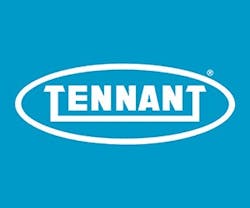SAFETY FIRST: Enhancing Safety for Those in Your Care
People expect healthcare facilities to be clean and safe, and ensuring the safety of patients, visitors and staff is among the most important jobs facilities directors perform. Reducing cleaning-related hazards – including slippery floors, poor indoor air quality, and handling and mixing chemicals – will help make your facility safer. Slip-and-fall accidents can account for a large number of lost work days, high medical costs and higher insurance rates. In addition to actually cleaning, ensuring floors are slip resistant is a key aim of a floor maintenance program.
Improperly diluted chemicals used in floor scrubbing machines can leave a slippery residue, increasing the risk of slip-and-fall accidents. Newer, chemical-free technologies leave no residue and actually remove built up chemical residue. This reduces the risk of slip-and-fall accidents and enables daytime cleaning while maintaining a safe environment.
“We don’t use chemicals on our floors, and using auto scrubbers helps ensure the floors are safe and not slick,” said Rod Pollard, Director of Environmental Services – Sodexo, University Hospitals Case Medical Center, Cleveland, Ohio. “We have one of the best safety records in the Cleveland area due to equipment and training, and over the last four years our accident rate has dropped at least 60 percent.”
In addition, chemical-free orbital scrubbing floor finish removal minimizes airborne chemicals, creating a safer environment for patients, employees and visitors.
Ÿ Rectangular scrub head easily reaches into corners and enclosed areas. Ÿ Ergonomic design reduces vibration and improves operator comfort. Ÿ Power and performance without the risk of chemicals.
Floor coatings and cleaning products that are certified by the National Floor Safety Institute (NFSI) as “high traction” also can reduce the risk of slip-and-fall accidents.
NFSI-certified floor coatings also make floors easier to clean by increasing durability and chemical resistance, and decreasing dust, dirt, and liquid build-up. This, in turn, reduces maintenance and protects the floor's natural life, so patients and visitors can appreciate clean, well-maintained floors and a better overall experience.
NFSI product certification requires a closed loop delivery system that reduces the chance of user error. To achieve the safest floors possible, combine NFSI-certified coatings with scrubbers featuring NFSI-certified chemical-free scrubbing technology.
“The only conventional cleaning chemicals we use in our new, 440,000-square-foot research building are bathroom disinfectants,” said John Jepsen, Resident Regional Manager, Housekeeping Services – Crothall, UMASS Memorial Medical Center, Worcester, Mass. “With 330 full-time equivalent staff, we’ve only had one slip-and-fall accident in the last 16 months – compared to five to 10 a year at a cost of up to $25,000 per accident.”
Another safety benefit of chemical-free cleaning is reduced risk of chemical splash accidents. Gloves and eye protection can help protect cleaning staff, but the safer route is using nontoxic products and cleaning processes that reduce risks to staff and patients.
Finally, because hospital cleaning must be performed while the building is occupied, using nontoxic or least toxic cleaning products is critical to enhancing safety. In order to promote a healing environment, consider cleaning products that minimize slip-and-fall accidents, splash accidents and have minimal impact on indoor air quality.
